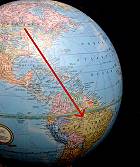the Amazon expedition (2006)

January 2006: I embarked on a two-week expedition up the Rio Negro, the largest tributary of the Amazon. It was the most exciting and most rewarding trip I've yet to take. Here is a view of what led to this trip...
the agenda
my goals
- the Rio Negro and the native habitat of many of the fishes I keep
- the tropical fish collection and exportation industry
- the people
- Project Piaba (more about this project below)
Project Piaba
My trip centered on the work of Project Piaba.
Project Piaba is an organization involved in the collection and exportation of aquarium fish in the Brazil. In short, they work to educate and enable the locals to responsible and profitable in the aqaurium fish trade.
Their slogan "buy a fish, save a tree" reflects one of their main missions: By helping the locals to responsibly harvest the renewable resources of small fish, they will be less tempted to slash and burn rainforest for ranching.
So the organization is involved in the social and economical aspects of the rainforest peoples and in the ecology of the rainforest itself. They teach the people how to collect responsibly. They monitor the fish populations to detect negative impacts. They work with the Brazilian government to establish regulations that are reasonable and effective and to offer incentive-driven programs such as pensions for collectors.
Much of my trip's experiences touched on Project Piaba and what I learn about them. I returned to the States armed with information and photos about this organization's work. "Hope" denotes an ongoing struggle to address some threats. Project Piaba helped me to understand what these threats are, and they provided insights as to how and how not these threats should be addressed.
my previous encounters with Project Piaba
 I first met Piaba's leader, Dr. Labbish Chow, while we were both speaking at the Raleigh Aquarium Society's annual workshop (2001). The photo includes Dr. Robert Goldstein who introduced us.
I first met Piaba's leader, Dr. Labbish Chow, while we were both speaking at the Raleigh Aquarium Society's annual workshop (2001). The photo includes Dr. Robert Goldstein who introduced us.
As a relatively new aquarist in the early 90's I read about the Piaba and its research in issues of TFH magazine (Tropical Fish Hobbyist). Little did I know that I would one day be a member of one of these expeditiions.
As many of you know, in 2005 I was able to explore a bit of the Australian rainforest. It was quite an experience. Still, I was just exploring the rainforest. The Australian trip and experience did not involve tropical fish or the aquarium hobby in which I am highly involved.
So this Amazon trip extended my previous rainforest experience. I got my hands wet in various waters of the Amazon basin -- marveling over the fish, the habitat, and the collecting trade.
Of all the rivers in the world, I believe the Rio Negro holds the most for me. It is the world's largest black water system and it is filled with the tetras I love.